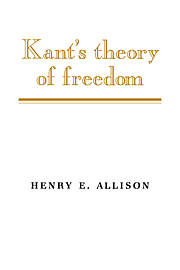Book contents
Introduction
Published online by Cambridge University Press: 05 June 2012
Summary
There can be little doubt regarding the centrality of the concept of freedom in Kant's “critical” philosophy. Together with the doctrine of the ideality of space and time, it constitutes a common thread running through all three Critiques. Although Kant does not claim to have established the reality of freedom in the Critique of Pure Reason, he does claim, on the basis of transcendental idealism, to have established its conceivability, that is, its compatibility with the causal mechanism of nature. Indeed, he even states that “were we to yield to the illusion of transcendental realism, neither nature nor freedom would remain” (A593/B571). And in the Critique of Practical Reason, where he does claim to have shown the reality of freedom, albeit from a “practical point of view,” he characterizes the concept of freedom as “the keystone of the whole architecture of the system of pure reason and even of speculative reason” (5: 3; 3). Finally, in the Critique of Judgment, Kant suggests that the faculty of judgment, by means of its concept of the purposiveness (Zweckmässigkeit) of nature, makes possible a transition from the realm of the concept of nature to that of the concept of freedom (5: 175–6, 195; 14–15, 35). Surely, then, it is no exaggeration to claim that, at bottom, Kant's critical philosophy is a philosophy of freedom.
Unfortunately, it is also no exaggeration to state that Kant's theory of freedom is the most difficult aspect of his philosophy to interpret, let alone defend.
- Type
- Chapter
- Information
- Kant's Theory of Freedom , pp. 1 - 8Publisher: Cambridge University PressPrint publication year: 1990



